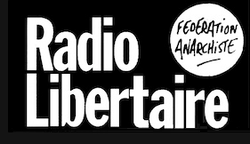Radio Libertaire
|
|
|
|---|---|
| La radio sans dieu, sans maître et sans publicité (Eng. The radio without God, without master and without advertising ) | |
| Radio station ( free radio ) | |
| reception | analog terrestrial , livestream |
| Reception area | Paris |
| Start of transmission | September 1, 1981 |
| owner | Federation of anarchist |
| List of radio stations | |
| Website | |
Radio Libertaire (dt. Libertarian radio ) is the Paris- based radio station of the French Anarchist Federation ( Fédération anarchiste ). Radio Libertaire is the oldest existing anarchist radio in the world. In Paris, Radio Libertaire can be received via VHF radio and worldwide as Internet radio.
program
Radio Libertaire is run by around 150 to 200 activists on a voluntary basis, is financed by donations and does not broadcast any advertising . The culture of debate and participation in this radio is also open to initiatives, organizations and people that are not organized in the Fédération anarchiste . The 24-hour program with nightly six-hour repetitions consists of music and cultural programs, talks , information and satirical programs .
Radio Libertaire is one of the few radio stations in the world that regularly broadcasts programs in the planned language Esperanto . Radio espéranto from the area around the Sennacieca Asocio Tutmonda broadcasts a one and a half hour bilingual program (Esperanto / French ) every week . The Esperantist and SAT activist Yves Peyraut was one of the co-founders of the station.
history
Radio Libertaire was founded in May 1981 after a long debate within the Fédération anarchiste . Previously there had already been anarchist radios in France with Radio Trottoir in Toulon and Radio Alarme in Évry . On September 1, 1981, six people from a small, damp cellar in Montmartre began official broadcasting.
In 1983 the French government decided to reorganize the radio bands. Many radio stations, including Radio Libertaire, have been banned from broadcasting. On 28 August 1983, the severed CRS the antennas and beat and arrested the activists , despite the presence of many listeners. On the following September 3, 5,000 people demonstrated for the resumption of broadcasting operations, which began again at the same time as reports about the demonstration.
Around 1998 Radio Libertaire moved to a new location with two studios so that programs can also be pre-produced. Radio Libertaire has been available as a live stream worldwide since 2003 .
literature
- Yves Peyraut: Radio Libertaire. La voix sans maître (= Pages libres ). 1st edition. Éditions du Monde Libertaire, Paris 1991, ISBN 2-903013-17-9 (French, publisher information ).
- Miguel Benasayag et al .: Libres comme l'air. Quinze nouvelles pour Radio Libertaire (= Pages libres ). 1st edition. Éditions du Monde Libertaire, Paris 1991, ISBN 2-903013-18-7 (French).
- Elisabeth Claude, Jean Pierre Fontan, Nicole Heyman, Philippe Raulin et al .: La plus rebelle des radios c'est… Radio Libertaire. 1981-1998 (= Pages libres ). 1st edition. Éditions du Monde Libertaire, Paris 1998, ISBN 2-903013-46-2 (French).
Web links
- Radio Libertaire (French)
- l'histoire frondeuse de Radio Libertaire - Radio broadcast on the history of Radio Libertaire on November 16, 2007 (French)
Individual evidence
- ^ Radio Esperanto. SAT-Amikaro, accessed on December 6, 2016 (French).
- ^ Radio Libertaire. Voice without a master . In: Trafik . No. 5 , April 1982, pp. 63 .
- ^ Radio Trottoir (Toulon: 1978-1980). Fédération internationale des centres d'études et de documentation libertaires, accessed on 10 July 2017 .
- ↑ a b Historique. In: Fédération anarchiste. Retrieved December 6, 2016 (French).
- ^ No God, no Master, no Publicity. Interview on Radio Libertaire with John from the Radio Secretariat . In: Gǎidào . No. 4 , 2011, p. 7–10 ( online [PDF; accessed December 6, 2016]).
Coordinates: 48 ° 51 '54.5 " N , 2 ° 21' 58.9" E

